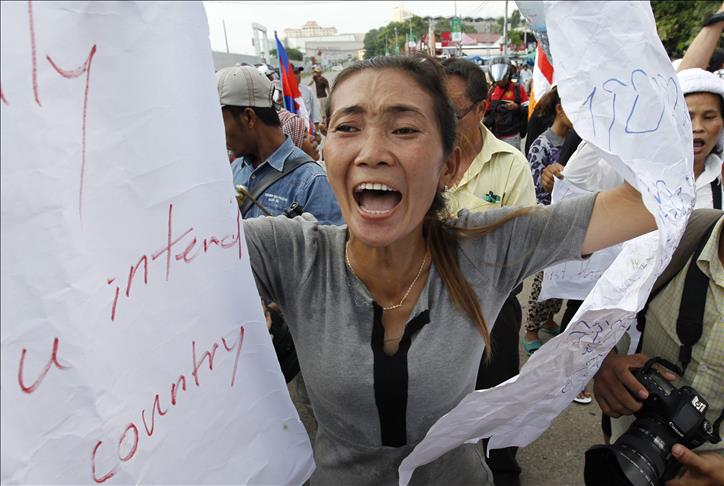
By Lauren Crothers
PHNOM PENH, Cambodia
Cambodia's government is being urged to scrap proposed legislation that could gag civil society groups in the lead-up to elections, amid fears that such a move would seriously inhibit people’s rights to freedom of expression.
In a statement issued Wednesday, the Cambodian Centre for Human Rights (CCHR) spoke of its grave concern for the proposed rules, which were first brought to light last month during talks on electoral reform held by the ruling CPP and opposition CNRP parties.
“The introduction of such measures would only serve to stifle public debate, impair citizens’ constitutional right to participate actively in the political life of the nation, and undermine civil society’s legitimate role in holding public authorities to account,” the CCHR said in a statement in reference to plans that would bar groups from saying anything seen to have “insulted” political parties during the campaign period.
“Whilst the right to freedom of expression is not absolute, restrictions can only be introduced where absolutely necessary to serve a legitimate aim, whereas a ban on giving media interviews appears intended to shield the government and members of political parties from criticism, rather than meeting any pressing social need,” it added.
In addition, the head of an election monitoring NGO told The Anadolu Agency on Wednesday that the proposal reeks of double standards, particularly when there are far greater issues that should be tabled to make elections fairer. Meanwhile, a member of the CNRP sought to clarify her party’s stance.
CCHR said the proposed rules are vague with regard to punishments that could be meted out, along with parameters for what is deemed insulting which could lead to “broad interpretation” of the law.
Cambodia’s 2013 elections were marred by allegations of corruption, from the improper registration of voters to fraudulent voting activities on the day the polls opened.
The elections are run by the National Election Committee, which is stacked with pro-CPP staff. When the CNRP decided to join government following 10 months of deadlock, one of the conditions was that the two parties would hold talks about electoral reform.
Last month, Kuoy Bunroeun, who heads the CNRP delegation tasked with negotiating electoral reform, was quoted by The Cambodia Daily as having told reporters that his party supported the CPP’s proposal, but that clauses were needed to ensure that no punishments would be handed out for minor offences.
Speaking to AA on Wednesday, Mu Sochua, the party’s public affairs chief and another member of the negotiating team, said the party’s stance had been taken out of context due to a misquotation.
“We support engagement, the full engagement of civil society throughout the election period as necessary, from the beginning to the final result,” she said.
“That’s what we’re working on technical groups. We met with them; we made conditions very clear with them because we were misquoted by the media. If there is any legislation that restricts the engagement of civil society, that will not come from us… We cannot exclude civil society in elections. It’s not in our vocabulary.”
A draft of the CNRP’s position on key elements of electoral reform includes a provision that calls for people to have the right to freedom of expression, regardless of their political opinion, without any interference.
Koul Panha, executive director of the Committee for Free and Fair Elections in Cambodia (Comfrel) told AA on Wednesday that there should be more concern around private channels that promote certain political parties than on the role of independent NGOs.
“It’s not a big issue,” he said. “The issue is about voter registration, about the NEC’s independence, its effective competence, access to media, the independence of the courts and ensuring that armed forces are non-partisan instead of carrying out political party activities,” he added.
He said he has personally urged the CNRP to refuse to accede to the proposal.
Anadolu Agency website contains only a portion of the news stories offered to subscribers in the AA News Broadcasting System (HAS), and in summarized form. Please contact us for subscription options.





